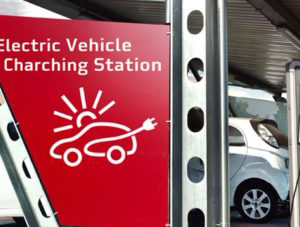Global electric car sales are expected to climb steadily every year through 2030, going from under a million in 2017 to more than 6 million by 2030. Slowly but steadily, the idea of exchange gasoline in favor for renewable and cleaner electric cars is taking hold.
The rise in electric cars is pushing the need for ancillary service around it, especially around charging. One of the downsides of electric vehicle ownership is constant charging. While capacity is constantly improving – a 200-mile range is the lofty new goal currently being pursued by Tesla and other major players in the space – electric cars still need to be recharged much more frequently than their gas-powered counterparts. While that may be an acceptable trade-off for the right consumer, there are still issues of accessibility of car charging outside the home. There are approximately 16,000 electric car charging stations across the United States, while there were way more than 150,000 gas stations at last official count.
This means that cars need to find every possible opportunity to charge up. Offering a few spaces in your parking garage or lot dedicated to electric charging stations may seem difficult if you operate a crowded lot, but the gamble is sure to pay off as the use of electric cars increases.
The costs — and payoff – of electric charging stations
Long-term savings is of the many reasons for the increased popularity of electric cars. Efficiency is typically measured in kilowatt hours (kWh) per 100 miles, as opposed to miles per gallon. And just like gasoline, the cost to fill up – or charge up, in this case – depends on the cost of electricity.
The U.S. Department of Energy’s Energy Efficiency and Renewable Energy department determines its sample calculations based on an electricity cost of 11 cents per kWh. If a car has a 70-mile range, it will cost the average driver $2.64 to reach a full charge.
Compare that to the average miles-per-gallon (MPG) calculation a new car. The average car can achieve 25.5 miles per gallon (this figure varies depending on the size of the vehicle). The average sedan holds 12 gallons worth of gas. As of November 2017, the national per gallon average for regular gasoline was $2.56. That means to operate a vehicle for approximately the same mileage, 76.5 miles, will cost $7.68. That’s close to triple the cost of charging an electric vehicle.
The downside here, as acknowledged earlier in this post, is frequency. The average 12-gallon-capacity car can drive 306 miles at 25.5 miles per gallon. Even if cars reach the predicted 200-mile range, that’s still a full 100 miles short of the gasoline-powered vehicle. So while it’s cheaper overall to operate an electric vehicle, it’s not exactly convenient yet. Charging stations need to be accessed more frequently than gas stations, and with so few charging stations compared to gas stations, accessibility becomes a necessity when out and about on the road. This means that offering electric car charging stations in your parking facility is a highly-desirable and marketable feature which can set you apart in the marketplace.
Now, the question turns to cost. Luckily, parking garage installation is among the easiest and most economic ways to build public electric car charging stations. Adding them to an existing facility costs between $2,300 and $6,000 per unit to install, depending on volume, brand and features.
Labor makes up anywhere from 60 to 80 percent of this installation cost. This is largely due to the logistics necessary to run electricity from the port to the spot. The cost skyrockets if a garage owner wishes to place electric car charging stations more than 150 feet away from the breaker box. Garage owners also need to consider the cost of adding multiple charging stations; more than a handful may require an electricity upgrade.
As parking facility owners tune in to the public’s rapidly-charging approach to cars, car ownership and driving, electric vehicles must be a part of the equation. Their increased use and subsequent demand of ancillary services such as charging stations is an easy way to place a parking facility ahead of the pack.

